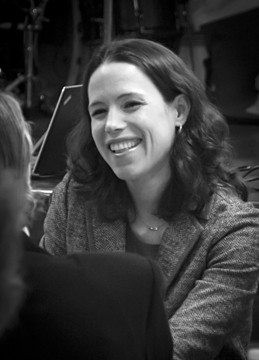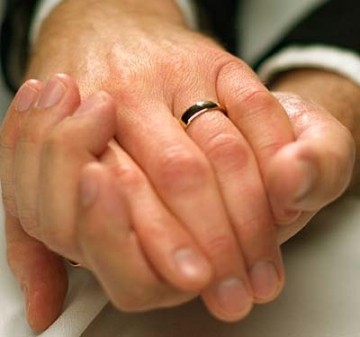Clark Prof Garners National Attention for Research on Gay Marriage
Saturday, March 09, 2013

The recent publication, titled, “Will I Marry if My Parents Can’t? Young Adults With LGB Parents Consider Marriage for Themselves,” continued her research to uncover something about a lesser studied group – children of LGB parents – to find how this new family model is affecting their thoughts on marriage.
Getting the Ball Rolling
Goldberg said that her drive to research this sector of the population stemmed from unanswered questions and assumptions from other scholars.
“My motivation for this work was the fact that scholars both for and against marriage equality have often made assumptions about how kids with gay parents must feel about marriage,” Goldberg said. “Conservative scholars have sometimes speculated that children and young adults with gay parents are likely to have less respect for marriage, for example, because of being raised in a ‘nontraditional’ family structure, with parents who aren’t married – although they don’t necessarily acknowledge that this is because, in most cases, they aren’t allowed to get married.”
Goldberg said that she had her own assumptions to bring to the table about how children of LGB parents would feel about marriage and the often inability of their parents to do so.
“On the other hand, some scholars – including myself – have speculated that kids of gay parents may feel ambivalent about marriage, because, assuming they are heterosexual, it is an institution that they can access but their parents cannot,” she said. “I found that for the most part, young adults do value the institution of marriage, but that some did feel ambivalent about marrying, themselves.”
Goldberg said this leaves children of LGB relationships in a difficult position when determining their own set of beliefs: “On one hand, they are exposed to dominant discourses of marriage as affording unparalleled symbolic and practical benefits to relationships… on the other hand, their LGB parents are restricted from accessing civil marriage themselves,” she writes in her recent publication.
These results, she says point to a changing feeling about marriage and what it means to be married.

Clark University professor, Abbie Goldberg.
The Findings

Clark University professor, Abbie Goldberg.
Goldberg’s study was exploratory and qualitative, derived from interviews of 35 adolescents and emerging adults (ages 15-28 years; mean age = 21 years) with LGB parents.
The study was based on four core questions: Are you married or have you ever been married? If not, do you want to get married some day? If you identify as heterosexual, is your desire to get married, or comfort with the idea of getting married, contingent on whether or not your LGB parent(s), or LGB people as a whole, can get married? Explain. What are your feelings and opinions concerning marriage equality for same-sex couples? (What has informed your opinions? Do your opinions differ from you parents?)
“Results revealed that many participants endorsed romantic ideas about marriage and hoped to someday marry themselves,” her abstract reads. “Other participants expected to marry, but solely for ‘pragmatic’ reasons (i.e., legal/financial protections). Some participants expressed concerns about the institution of marriage, and therefore rejected marriage for themselves—although some conceded that they might marry if and when all LGB people were able to marry.”
A small group of participants expressed a desire to marry, but Goldberg’s study showed that group still struggled with the idea of marrying when their LGB parents could not.
“These findings reveal great diversity in the marital desires of young adults with LGB parents, and highlight the various social contexts that ultimately shape their beliefs and intentions surrounding marriage.”

Reception

In the Atlantic article on Goldberg’s work, the author, Alexis Coe, said that the Clark professor’s research, “constitutes a substantial contribution to the modest body of literature on the LGB community's decision-making process, but she cannot predict how the young adults' perspectives and desires will mean in the future,” and that she is “at the forefront of this investigation.”
“Hopefully, Goldberg will both revisit these participants in a few years and expand her studies to include a greater balance of LGB families, specifically more households in which both parents are male.”
Lingering Questions
With this first look at how children of LGB parents feel about the institution of marriage, Goldberg was still left with some unanswered questions.
“A question I am left with is how, as marriage equality becomes more of a reality, young adults’ attitudes may shift or change,” she said.
When asked if she thought future research would include a deeper look into a changing definition of marriage, Goldberg said, “Yes…I do…young adults in general. As adults marry later and later, and marriage as an option becomes more available to [same-sex] couples, I think we will continue to see interest in the reasons why young adults might delay marriage, and whether and how those reasons are similar across young adults from varying family structures.”
The Clark professor has published extensive research on the topics of family diversity, gender, and marriage.
Related Articles
- NEW: Clark Professor Examines Collective Bargaining in New Book
- Clark Alum Catalina Escobar is one of CNN’s Top 10 “Heroes”
- Clark Opens New Exhibit: FORM+CONTENT+CONTEXT
- Clark Student and Newtown Native Helps Community Heal Through Art
- Clark Names Outgoing UMass Memorial CEO as Distinguished Professor




 Delivered Free Every
Delivered Free Every
Follow us on Pinterest Google + Facebook Twitter See It Read It